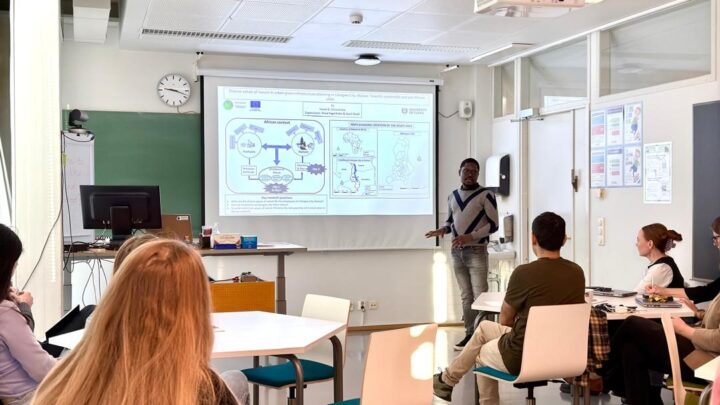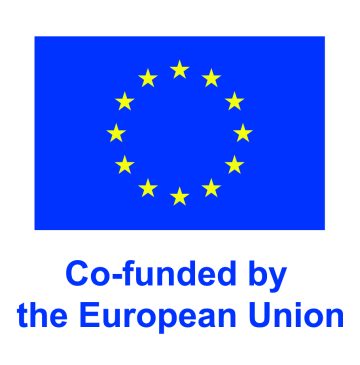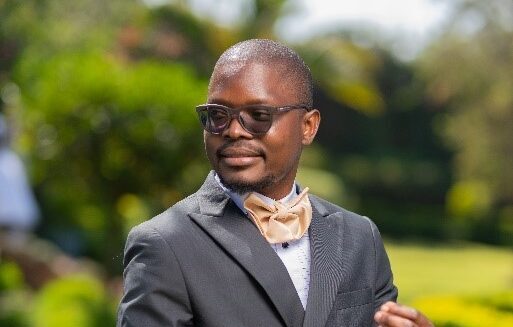From a dream to reality: Navigating through my PhD Journey
Have you ever had this experience where you encounter an advert and feel certain electricity, excitement, or a voice in your head telling you that this position is for you? I do not know how best to explain it, but that was the feeling I had when I came across the UTU-GreDiT PhD positions advert, especially the project under Sustainable Landscape Systems Research Group.

Frank b. Chimaimba presenting his PhD research concept during Doctoral school-Finnish Geography Day 2024 (Picture Courtesy of Msilikale Msilanga)
Introduction
As I sat down in my working space at the Department of Geography and Geology, University of Turku, Finland, thinking about what I could write and share regarding my PhD journey as a UTU-GreDiT research fellow, my mind was flashed with so many good and exciting ideas and moments, that it was difficult to pick from. However, every time I thought about this, my mind kept pushing me to write my full story, from my dreams to their realization, and the lessons I have learned along the way. The idea of this write-up is to try to inspire some aspiring PhD researchers and my fellow new PhD researchers, while I am also reaching out to everyone interested in PhD journey stories. It also serves as a reminder for myself, (and perhaps my grandchildren), in the future about how I started it all.
I have structured it in 3 sections, the first section focuses on how the dream of pursuing PhD started, the second section is about key two excitements as a new PhD researcher and the last one is about my PhD research and status. I believe you will enjoy it.
It all started with a dream followed by action.
I posted a picture of myself on WhatsApp, a few weeks after I arrived in Turku, Finland for My PhD studies. Immediately I received comments from a couple of my friends, but these two comments, in the form of questions, were the most common: “How did you get PhD admission at the University of Turku, Finland?”; and “How did you find the UTU-GreDiT (Solutions for Green and Digital Transition) Scholarship?” I do not recall the details of my responses, but it went like this: “It all started with a dream, a desire to pursue a PhD.” I personally strongly believe that dreams are the foundation of anything, including a PhD.
I had many dreams of what I wanted to do when I finished my Master of Science Degree (MSc.) at the University of Malawi in 2019. One part of me wanted to pursue a PhD and the other part wanted me to work. These thoughts conflicted with each other for some time until later in 2020 I got a job. My dream of pursuing a PhD had almost died. It sometimes would blurrily re-appear, but I would always blush it off. In the year 2022/2023 when my work contract was close to an end, the dream of pursuing a PhD re-appeared strongly. I tried to blush it off as usual but it kept appearing. That gave me a push to start devoting some of my time to searching and applying for PhD opportunities. You see, I argue that the 21st century is the easiest time in human history to access worldwide information and opportunities including PhD positions because of the internet. It only requires a person to make time and effort to search for them. For me, I allocated my early morning hours to search and file PhD applications. And because of this effort, I could find and file my applications for relevant PhD positions from universities around the globe. As I was writing this blog, I checked my Mail inbox, and I have sent approximately 100 applications. Some colleagues have sent more or fewer, but the common among us all is that we put effort into finding our PhD opportunities.
In late 2023, as I was searching for PhD position opportunities, as per my morning routine, I came across an advert about the UTU-GreDiT PhD program led by the University of Turku, Finland, co-funded by European Union’s Horizon Europe research and innovation programme’s Marie Skłodowska-Curie Action, calling for 25 PhD positions. The number of positions caught my attention. By this time, based on experience, I told myself to target PhD opportunities with many openings to increase my chances of being selected. With keen interest, I opened the advert to check if there was anything relevant for me, and boom!!!!, I found 3 relevant projects. For you to understand better, the 25 UTU-GreDiT PhD positions were/are segregated into 12 projects from 14 different research groups at the University of Turku. The instructions were to choose only one project, so I had to weigh my strengths and weaknesses, together with my research interests, through the lens of the 3 projects I deemed relevant. This process led me to one project titled “Diverse Values of Nature Supporting Human and Other Species Wellbeing in Urban Green Infrastructure Planning” under the Sustainable Landscape Systems Research Group in the Department of Geography and Geology, headed by Assoc. Prof. Nora Fagerholm.
Have you ever had this experience before, where you encounter an advert, and you feel a certain electricity or excitement or voice in your head telling you that this position is for you? I do not know how best to explain it, but that was the feeling I had when I came across the UTU-GreDiT PhD position advert, especially the project under Sustainable Landscape Systems Research Group. What attracted me most to UTU-GreDiT PhD positions was the design of the program that incorporates the provision of transferable skills to the PhD researchers and the provision of National or international secondments.
I immediately started preparing for my application. Besides searching for opportunities, I consider the application phase as another important step to be taken seriously. Developing a successful PhD application is not easy but it’s doable. To cut a long story short, I started gathering all the needed documents, and I started preparing my online application. It took me almost 4 weeks to finalize and submit my application. The key lesson in the application phase is that a successful PhD application is never built in a day, but it’s built through daily compounded efforts. The desire for the goal can sometimes get tested, but we have to keep on pushing. Nobody said it’s going to be a smooth ride.
Fast forward, my application was successful in all stages and I got selected for oral-online interviews. As per the old saying, “Failing to prepare is preparing to fail”, I had also to spare some preparation time for the interviews. I had to go through literature online and YouTube videos about successful PhD researchers. More importantly, I had to go through the University of Turku website, my supervisor’s profile, and her research group, to understand how their research interests are aligned with my interests. I now agree that to have a successful PhD interview nothing replaces good preparation because I was and am among the 25 selected PhD researchers for the UTU-GreDiT program.
Can a PhD journey be exciting?
PhD journey or life is likened to many things such as a marathon, a journey with ups and downs, or a roller-coaster. One thing common in these is that the Ph.D. journey is never a smooth ride. This mentality is almost everywhere. Back home, in Malawi, when I was preparing to leave for Finland, I had to bid farewell to some good friends. Everyone said something like “You know Frank, PhD is not easy”. It’s hilarious that even those who have not yet done their PhD had to say the same things. To make things even more fun, to portray how difficult a PhD is, people have retranslated the PhD. Acronym to “Permanent head Damage” (PhD). This is how a PhD is painted.
Much as I agree with everyone that indeed PhD is not an easy-peasy pursuit, I want to be a positivist for a moment and bring to picture other aspects of PhD that can make it an exciting and rewarding journey amidst difficulty. I will share and explain only two key things that I think make my PhD exciting in my context as a new PhD researcher at the University of Turku, Finland under a UTU-GreDiT fellowship.
I think PhD is a journey of expanding my network. Looking closely into the time spent pursuing a PhD, you will notice a good amount of it is spent on knowing new people and building connections through attending seminars, conferences, etc. I am just a few months old at the Department of Geography and Geology, University of Turku, but I have already attended a good number of seminars, conferences, and meetings, through which I have made new friends, colleagues, mentors, and role models. Imagine connections I can make in 3-4 years of my entire PhD. UTU-GreDiT program makes connections even more possible and exciting through different planned events, including seminars and secondments. Making friends and connections is not for everyone, I for one am not even close to calling myself good at this, but I strive to be good. What motivates me is this phrase in which somebody said “Your network is your net-wealthy”. This simply means that the networks you have and the relationships you build with others can have a direct impact on your success and overall wealth.
A PhD is more of a Learning process through challenges. I have had some moments in life where I look back at my past and see and feel all the challenges I have been through, and say to myself that if it wasn’t for such challenges, I would not have learned A, B, and C. I think PhD journey is more like the same. We will look back and admire all the lessons learned throughout the journey. Challenges are the best learning point of human life. They have shaped us as to who we are as a species. However, I want to say that, besides waiting for the future and looking back, using the same mentality, we can also enjoy passing through the challenges in the present. One example of a challenge I have encountered is chasing deadlines while having so many things to do on my calendar. One exciting lesson I have learned is that there will always be tight schedules and many things to do, but I have to prioritize. Again, this is something that I am not very good at, but I am trying and learning every day. One other thing that I like about the design of the UTU GreDiT fellowship is its emphasis on imparting transferable skills to the PhD researchers. I believe this will make the PhD learning process even more exciting throughout the challenges.
Where am I with my research?
Lastly, I want to share with you my research (what it’s all about and where I am as I write this blog). My thinking is that some might be interested in what I am studying, and I also would like to give you more details of my research progress shortly.
My working research title is “Diverse Values of Nature in Urban Green Infrastructure for Lilongwe City, Malawi: Towards Sustainable and Just African Cities”. In this study, I mainly want to research how residents of Lilongwe city, Malawi value or disvalue nature within the city, and how this information can potentially support the planning of and decision-making about green spaces to achieve a just and sustainable city. I will be working with the following 3 specific objectives: (1) To research diverse (dis)values of nature over space held by inhabitants of Lilongwe city, Malawi, (2) To assess the city inhabitants’ (dis)values of nature using a statement-based approach, and (3) Assess the extent to which values of nature can potentially support urban green infrastructure planning and decision-making for just and sustainable city. The first objective will be achieved using a survey and participatory mapping; the second objective will be realized using Q methodology and choice experiments; and the third objective will be attained using key informant interviews and document analysis.
Currently, I am preparing for my field data collection exercise for my first objective which is planned to be done by mid this year. Through this field exercise and other things, I am looking to the next blog to share more experiences.
 Co-funded by the European Union. Views and opinions expressed are however those of the author(s) only and do not necessarily reflect those of the European Union or European Research Executive Agency (REA). Neither the European Union nor REA can be held responsible for them.
Co-funded by the European Union. Views and opinions expressed are however those of the author(s) only and do not necessarily reflect those of the European Union or European Research Executive Agency (REA). Neither the European Union nor REA can be held responsible for them.
